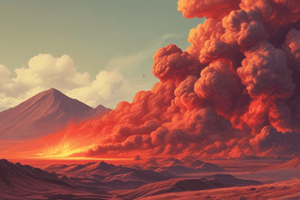Podcast
Questions and Answers
Which of the following is NOT a characteristic of a shield volcano?
Which of the following is NOT a characteristic of a shield volcano?
- They have a broad, slightly domed structure.
- They are formed by the accumulation of lava flows.
- They are steep-sided and cone-shaped. (correct)
- They resemble a warrior's shield in shape.
What is the primary difference between a phreatic and a phreatomagmatic eruption?
What is the primary difference between a phreatic and a phreatomagmatic eruption?
- Phreatic eruptions are less common than phreatomagmatic eruptions.
- Phreatomagmatic eruptions are more explosive than phreatic eruptions. (correct)
- Phreatic eruptions are driven by magma, while phreatomagmatic eruptions are driven by water.
- Phreatomagmatic eruptions produce more ash than phreatic eruptions.
Which type of volcano eruption is characterized by periodic weak to violent eruptions with fountain lava?
Which type of volcano eruption is characterized by periodic weak to violent eruptions with fountain lava?
- Strombolian (correct)
- Vulcanian
- Phreatic
- Phreatomagmatic
What is a caldera?
What is a caldera?
Which of the following is an example of a composite volcano (stratovolcano)?
Which of the following is an example of a composite volcano (stratovolcano)?
Why is a volcano considered active?
Why is a volcano considered active?
What is the molten rock that is found beneath the Earth's crust called?
What is the molten rock that is found beneath the Earth's crust called?
What is the primary significance of volcanoes in relation to life on Earth?
What is the primary significance of volcanoes in relation to life on Earth?
Flashcards
Volcano
Volcano
A natural opening on Earth's surface for ejection of molten rocks, smoke, gases, and ashes.
Parts of a Volcano
Parts of a Volcano
Volcanoes consist of a base, slope, and summit where the crater is located.
Crater
Crater
A funnel-shaped depression formed by explosive eruptions at the summit.
Caldera
Caldera
Signup and view all the flashcards
Shield Volcano
Shield Volcano
Signup and view all the flashcards
Composite Volcano
Composite Volcano
Signup and view all the flashcards
Active Volcano
Active Volcano
Signup and view all the flashcards
Plinian Eruption
Plinian Eruption
Signup and view all the flashcards
Study Notes
Volcano Definition
- Volcanoes are natural openings on Earth's surface where molten rocks, smoke, gases, and ashes are ejected.
- Mayon Volcano in Albay, Philippines is a popular example of a perfect cone volcano.
Volcano Parts
- Volcanoes have three parts:
- Base
- Slope
- Summit, where the crater is located.
- Crater is a funnel-shaped depression formed by explosive eruptions.
- Caldera is formed when a part of the crater wall collapses after an explosive eruption, often triggered by emptying of the magma chamber beneath the volcano.
- Magma is molten rock beneath the Earth's crust.
- Lava is magma that has been ejected from a volcano.
Volcano Classifications
- Volcanoes can be classified by shape and eruption type.
Volcano Types by Shape
- Shield Volcano: Formed by accumulation of lava flows, broad with a slightly domed structure resembling a warrior's shield.
- Example: Mauna Loa in Hawaii
- Cinder Cone Volcano: Built from ejected lava fragments, steep slopes, wide crater, most abundant type.
- Example: Mount Paricutin in Mexico
- Composite Volcano (Stratovolcano): Large, nearly perfect slope structure formed by alternating solidification of lava and pyroclastic deposits.
- Example: Mayon Volcano in the Philippines
Volcano Types by Eruption
- Phreatic: Steam-driven eruption caused by hot rocks contacting water, also known as hydrothermal eruption.
- Example: Taal Volcano eruption in January 2020
- Phreatomagmatic: Violent eruption caused by interaction between water and magma, resulting in a fine ash eruption.
- Strombolian: Periodic weak to violent eruptions characterized by fountain lava.
- Vulcanian: Tall eruptions reaching up to 20 kilometers high, with pyroclastic flow and ash tephra.
- Plinian: Extremely explosive eruption of gas and pyroclastic material, intensely violent.
- Example: Mount Pinatubo eruption in 1991
Volcano Activity Levels
- Active Volcano: Has a record of eruption.
- Inactive Volcano: Shows no activity and no record of eruption.
- Example: Mount Kanlaon in Negros Occidental, Philippines
Volcano Significance
- Volcanoes contribute to life on Earth by keeping the Earth warm and providing water, essential for sustaining life.
Studying That Suits You
Use AI to generate personalized quizzes and flashcards to suit your learning preferences.




